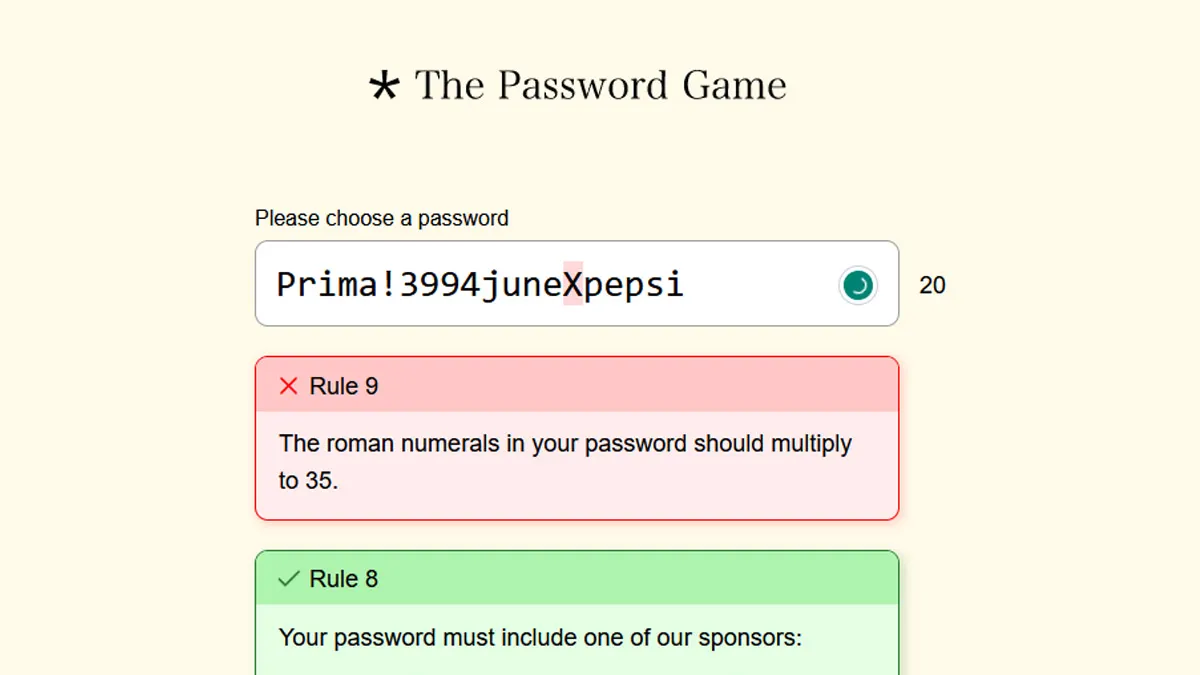The Password Game is known for its unique and often challenging rules that push players to think outside the box. One of these rules, Rule 9, requires players to incorporate Roman numerals that multiply to 35 into their passwords.
This guide will delve into the details of Rule 9, providing an extensive look at Roman numerals, their combinations, and practical examples to help you navigate this tricky part of the game.
What are Roman numerals
Roman numerals are an ancient number system that originated in Rome. They are still used today in various contexts, such as on clock faces and in book chapters. Here are the basic Roman numerals and their values:
- I = 1
- V = 5
- X = 10
- L = 50
- C = 100
- D = 500
- M = 1000
Roman numerals are combined to form other numbers. For example, II is 2, III is 3, IV is 4, and so on. Larger numbers are formed by placing a numeral before or after another numeral to indicate subtraction or addition. For instance, IX is 9 (10 – 1), while XI is 11 (10 + 1).
Multiplying Roman numerals to 35
Rule 9 requires you to include Roman numerals in your password that, when multiplied, equal 35. This means you need to find combinations of Roman numerals whose product equals 35. Here are the combinations that work:
- V (5) and VII (7): This combination is straightforward. By including V and VII in your password, you can satisfy Rule 9 because 5 multiplied by 7 equals 35.
- XXXV (35) and I (1): This combination is also valid because 35 multiplied by 1 equals 35. However, using XXXV might be less practical in some passwords due to its length and complexity.
Using V and VII in your password
Using V and VII is the most straightforward and commonly recommended approach. Here’s how you can incorporate these numerals into your password:
Example Passwords:
- “SafeVVIIPassword”: This password includes both V and VII while maintaining simplicity and coherence.
- “StrongVVIICode123”: Adding numbers or other characters can enhance security while still satisfying Rule 9.
Ensuring Compatibility with Other Rules:
When forming your password, it’s important to ensure that the numerals you use do not conflict with other rules. For example, Rule 7 might require specific characters or formats, so planning your password holistically is essential.
Using XXXV and I in your password
While using XXXV and I is less common, it is still a valid approach. Here are some examples of how to integrate these numerals:
Example Passwords:
- “SecureXXXVIKey”: This password uses XXXV and I together, ensuring compliance with Rule 9.
- “UnlockXXXVILock”: This example combines the numerals with relevant words to create a coherent password.
Considerations:
- Length and Complexity: Using XXXV can make your password longer and potentially more complex, which might impact its usability with other rules.
- Flexibility: This combination offers less flexibility compared to using V and VII, especially if future rules impose additional constraints.
Common pitfalls
When integrating Roman numerals into your password, it’s easy to make mistakes that could invalidate your password. Here are some common pitfalls to watch out for:
- Adding Extra Numerals: Including other Roman numerals unintentionally can create problems. For example, if another rule asks you to include a month, writing “March” (which contains M) might conflict with Rule 9.
- Capitalization: Ensure that the Roman numerals are capitalized as required by the game.
- Compatibility with Future Rules: Always consider how your choice of numerals might impact your ability to comply with future rules.
Practical strategies for success
Successfully navigating Rule 9 requires a strategic approach. Here are some practical strategies to help you succeed:
- Plan Ahead: Think about potential future rules and how your current choices might impact your ability to comply with them.
- Stay Flexible: Choose combinations that offer flexibility for adding other required elements later in the game.
- Keep it Simple: Whenever possible, opt for simpler combinations like V and VII to minimize complexity.
RELATED ARTICLES
- Ultimate Squid Game Quiz: Test Your Knowledge with 50+ Trivia Questions
- Navigating Sports Wagering in Texas: Opportunities and Challenges
- Unraveling the Mystery of the Star Plasma Vessel in Jujutsu Kaisen
- Madden NFL 25: A Comprehensive Review of Gameplay and Presentation
- Master Tengen: The Guardian of Jujutsu Kaisen’s Balance
Example of a Holistic Password:
“SecureVVIIPass@123”: This password not only satisfies Rule 9 but also includes special characters and numbers, making it more secure and adaptable to future rules.
Conclusion
Rule 9 in the Password Game adds a layer of complexity that requires careful planning and understanding of Roman numerals. By mastering the use of Roman numerals and integrating them thoughtfully into your password, you can successfully navigate this rule and continue progressing in the game.
Whether you choose the simplicity of V and VII or the uniqueness of XXXV and I, understanding the basics and avoiding common pitfalls will ensure your password remains valid and adaptable for future challenges.









